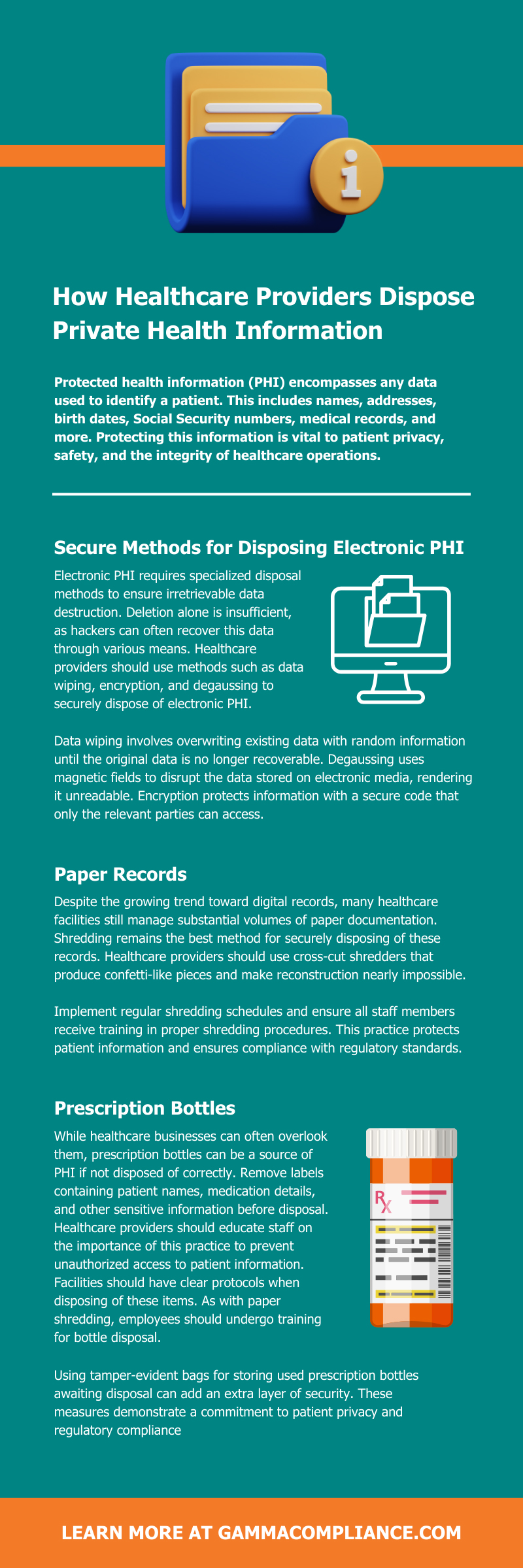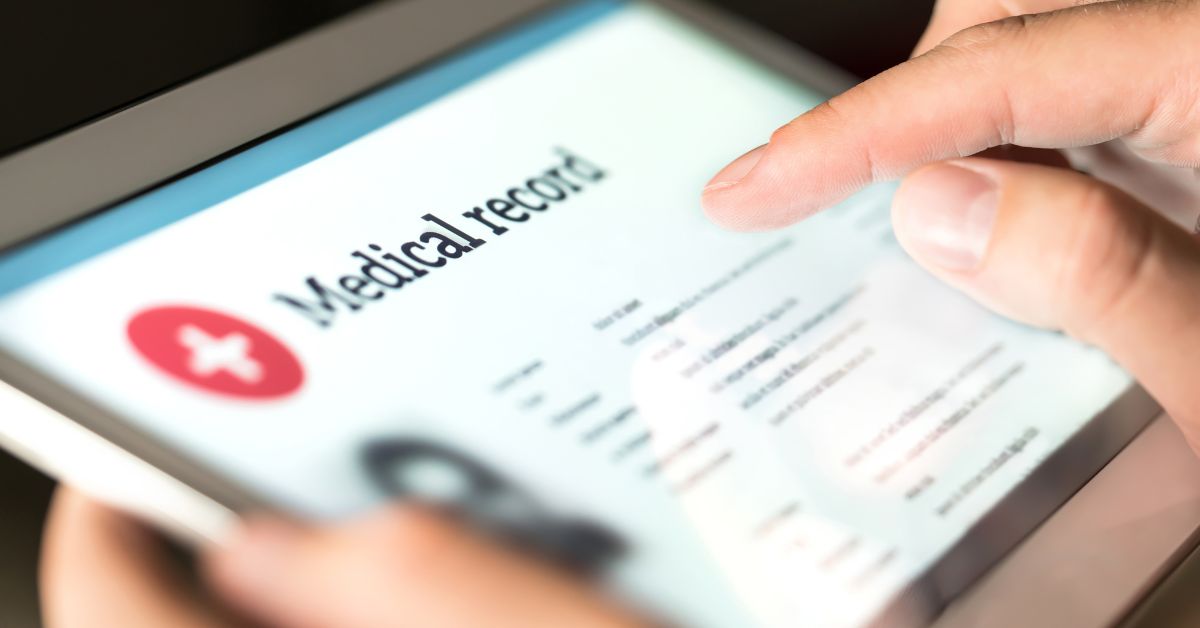In an era where data breaches are commonplace, the healthcare industry faces significant pressure to securely manage and dispose of protected health information (PHI). This responsibility is about maintaining the trust and safety of patients as much as it is about maintaining your business’s compliance. Healthcare professionals must understand the importance of PHI disposal, the risks of improper handling, and the correct methods to ensure data security. Keep reading to learn how healthcare professionals should dispose of private health information.
What Is Protected Health Information?
Protected health information (PHI) encompasses any data used to identify a patient. This includes names, addresses, birth dates, Social Security numbers, medical records, and more. Protecting this information is vital to patient privacy, safety, and the integrity of healthcare operations. PHI is sensitive, and healthcare professionals must handle it carefully to avoid unauthorized access.
Understanding what qualifies as PHI is the first step in ensuring its secure disposal. Knowing the scope of PHI will guide healthcare professionals in implementing effective disposal methods.
Importance of Disposing of Protected Health Information
Proper disposal of PHI is a critical component of healthcare management. When PHI is no longer needed, healthcare professionals must dispose of it safely to ensure the wrong parties can’t receive or reconstruct it. This protects patient privacy and safeguards the healthcare facility from potential legal repercussions. Failure to comply with HIPAA regulations that protect PHI could result in lawsuits and damaged reputations.
Dangers of Not Disposing of PHI Properly
Improper disposal of PHI poses significant risks. Unauthorized individuals could gain access to sensitive information, which could lead to identity theft, financial fraud, and other forms of exploitation. Because of these dangers, healthcare providers must incorporate secure disposal practices into their daily operations. This practice demonstrates a commitment to patient confidentiality and organizational integrity.
In addition to legal consequences, failure to dispose of PHI properly can lead to a loss of trust between patients and healthcare providers. Patients rely on healthcare organizations to protect their personal information. When practices break this trust, it can have long-lasting effects on patient relationships and overall healthcare delivery.
Overview of Regulatory Requirements for PHI Disposal
Regulatory requirements for PHI disposal are in place to protect patient data and ensure healthcare providers follow best practices. The Health Insurance Portability and Accountability Act (HIPAA) sets national standards for PHI protection and outlines specific guidelines for its disposal.
HIPAA mandates that healthcare providers implement policies and procedures to secure electronic and physical PHI disposal. Complying with these regulations is essential to avoid penalties and maintain the integrity of healthcare operations. Understanding and adhering to these requirements is a fundamental responsibility for all healthcare professionals.
Secure Methods for Disposing Electronic PHI
Electronic PHI requires specialized disposal methods to ensure irretrievable data destruction. Deletion alone is insufficient, as hackers can often recover this data through various means. Healthcare providers should use methods such as data wiping, encryption, and degaussing to securely dispose of electronic PHI.
Data wiping involves overwriting existing data with random information until the original data is no longer recoverable. Degaussing uses magnetic fields to disrupt the data stored on electronic media, rendering it unreadable. Encryption protects information with a secure code that only the relevant parties can access.
Secure Methods for Disposing Physical PHI
Physical PHI, such as paper records and prescription bottles, also requires secure disposal methods. Here are some of the best methods for handling and disposing of these traditional items.
Paper Records
[IMAGE B]
Paper records continue to be a significant source of PHI. Despite the growing trend toward digital records, many healthcare facilities still manage substantial volumes of paper documentation. Shredding remains the best method for securely disposing of these records.
However, pay close attention to the type of shredder your office uses. Healthcare providers should use cross-cut shredders that produce confetti-like pieces and make reconstruction nearly impossible.
Healthcare providers should implement regular shredding schedules and ensure all staff members receive training in proper shredding procedures. This practice protects patient information and ensures compliance with regulatory standards.
Prescription Bottles
While healthcare businesses can often overlook them, prescription bottles can be a source of PHI if not disposed of correctly. Remove labels containing patient names, medication details, and other sensitive information before disposal. Healthcare providers should educate staff on the importance of this practice to prevent unauthorized access to patient information. Facilities should have clear protocols when disposing of these items. As with paper shredding, employees should undergo training for bottle disposal.
Using tamper-evident bags for storing used prescription bottles awaiting disposal can add an extra layer of security. These measures demonstrate a commitment to patient privacy and regulatory compliance.
Future Trends and Technologies in PHI Disposal
PHI disposal will likely see advancements in technology and practices in the future. Innovations such as advanced encryption methods are beginning to enhance the security of electronic PHI disposal. These technologies can provide additional layers of protection against unauthorized access.
Healthcare providers should stay informed about emerging trends and technologies in PHI disposal. Adopting new methods can further secure patient information and streamline disposal processes. Continuous improvement in this area is essential for maintaining high standards of data security.
Where To Learn More About PHI Best Practices
Healthcare professionals seeking to improve their understanding of PHI best practices can access a range of resources. HIPAA compliance training programs, such as those offered by Gamma Compliance Solutions, provide comprehensive PHI management and disposal education. These programs are invaluable for ensuring compliance and enhancing professional knowledge.
Staying updated with industry standards and regulatory changes is crucial for healthcare providers. Regular training and education help maintain the highest levels of data security and patient confidentiality.
Gamma Compliance Solutions offers extensive HIPAA training resources designed to equip healthcare professionals with the knowledge needed to securely manage PHI. Our programs cover all aspects of PHI management, including disposal best practices, regulatory requirements, and advanced security measures.
Enrolling in these training programs can significantly enhance a healthcare practice’s ability to protect patient information. Gamma Compliance Solutions provides practical, up-to-date training that is essential for compliance and professional development.
Proper disposal of PHI is a critical aspect of healthcare management. From understanding what constitutes PHI to implementing secure disposal methods, healthcare providers play a vital role in protecting patient information. Staying informed about regulatory requirements and emerging technologies is essential for maintaining high standards of data security.
Regularly review and update your practice’s disposal guidelines. Investing in HIPAA training programs, such as those offered by Gamma Compliance Solutions, can provide valuable insights and ensure compliance with regulatory standards. By taking proactive steps, healthcare providers can safeguard patient information and maintain the trust and confidence of those they serve. Prioritize the secure disposal of PHI in your organization today. Stay compliant, protect patient privacy, and contribute to a safer healthcare environment.



